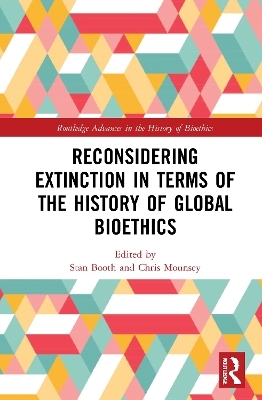
Reconsidering Extinction in Terms of the History of Global Bioethics
Routledge (Verlag)
978-0-367-61933-6 (ISBN)
Reconsidering Extinction in Terms of the History of Global Bioethics continues the Routledge Advances in the History of Bioethics series by exploring approaches to the bioethics of extinction from disparate disciplines, from literature, to social sciences, to history, to sustainability studies, to linguistics. Van Rensselaer Potter coined the phrase “Global Bioethics” to define human relationships with their contexts. This and subsequent volumes return to Potter’s founding vision from historical perspectives, and asks, how did we get here from then? Extinction can be understood in terms of an everlasting termination of shape, form, and function; however, until now life has gone on. Where would we humans be if the dinosaurs had not become extinct? And we still manage to communicate, only not in proto-Indo-European, but in a myriad of languages, some more common than others. The answer is simple, after extinction events, evolution continues. But will it always be so? Has the human race set planet earth on a collision course with nothingness? This volume explores areas of bioethical interpretation in relation to the complex concept of extinction.
Stan Booth is an Associate Lecturer at the University of Winchester. Chris Mounsey is Professor of Eighteenth-Century Cultural Studies at the University of Winchester.
Introduction: Is Extinction a Thing of the Past? 1
STAN BOOTH
PART I
Delineating Contexts—Extinction 9
1 “Enough to Change a Planet”: Feeling Extinction in Contemporary Literature 11
HEATHER J. HICKS
2 This Selfish Ape 37
NICHOLAS P. MONEY
3 The Extinction of Intellectual Disability: An Enlightenment Project from Locke to Freud 50
SIMON JARRETT
4 “Civilizing the ‘Redman’…”: John Locke, Adam Smith, and Social Darwinist Perceptions of Religion, Land-Use, and Progress as Policy to Make Extinct the Traditional Lifeways of North American Indian Peoples 68
CHRISTINA WELCH
PART II
Applying Contexts—Extinction Does Not Lead to an “End” 95
5 “Strong in Zeal but Impotent in Head”: British Responses to the Cattle Plagues of the Eighteenth Century 97
CHRIS MOUNSEY
6 “They Are All Dead, Except a Few”: Social Complications and Royal Reactions to Death in England, 1348–1350 112
WENDY J. TURNER
7 The Right to a Cure: The Bioethics of Variolation 136
STAN BOOTH
PART III
Creating “New” Contexts—Evolution 155
8 Tinkering with Eden: The Lure and Myth of Free-Willed Nature 157
IAN D. ROTHERHAM
9 Whose Utopia?: The Complexity of Incorporating Diverse Ethical Views Within Nature Governance Frameworks 184
JOANNA MILLER SMALLWOOD
10 For An Actional Ethics: Making Better Sense of Science 205
STEPHEN J. COWLEY
11 The Descent of Language: Biology, Linguistic Evolution, and Language Extinction 222
ERIC LACEY
| Erscheinungsdatum | 22.12.2022 |
|---|---|
| Reihe/Serie | Routledge Advances in the History of Bioethics |
| Zusatzinfo | 2 Tables, black and white |
| Verlagsort | London |
| Sprache | englisch |
| Maße | 152 x 229 mm |
| Gewicht | 362 g |
| Themenwelt | Geschichte ► Allgemeine Geschichte ► Neuzeit (bis 1918) |
| Geisteswissenschaften ► Geschichte ► Geschichtstheorie / Historik | |
| Geschichte ► Teilgebiete der Geschichte ► Kulturgeschichte | |
| Naturwissenschaften | |
| ISBN-10 | 0-367-61933-4 / 0367619334 |
| ISBN-13 | 978-0-367-61933-6 / 9780367619336 |
| Zustand | Neuware |
| Haben Sie eine Frage zum Produkt? |
aus dem Bereich


